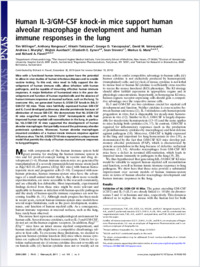Human IL-3/GM-CSF knock-in mice support human alveolar macrophage development and human immune responses in the lung
- Willinger, Tim Department of Immunobiology, Yale University School of Medicine, New Haven
- Rongvaux, Anthony Department of Immunobiology, Yale University School of Medicine, New Haven
- Takizawa, Hitoshi Division of Hematology, University Hospital Zurich, Zurich, Switzerland
- Yancopoulos, George D. Regeneron Pharmaceuticals, Inc.,Tarrytown, NY
- Valenzuela, David M. Regeneron Pharmaceuticals, Inc.,Tarrytown, NY
- Murphy, Andrew J. Regeneron Pharmaceuticals, Inc.,Tarrytown, NY
- Auerbach, Wojtek Regeneron Pharmaceuticals, Inc.,Tarrytown, NY
- Eynon, Elizabeth E. Department of Immunobiology, Yale University School of Medicine, New Haven - The Howard Hughes Medical Institute, Yale University School of Medicine, New Haven
- Stevens, Sean Regeneron Pharmaceuticals, Inc., Tarrytown, NY
- Manz, Markus G. Division of Hematology, University Hospital Zurich, Zurich, Switzerland - Institute for Research in Biomedicine (IRB), Faculty of Biomedical Sciences, Università della Svizzera italiana, Switzerland
- Flavell, Richard A. Department of Immunobiology, Yale University School of Medicine, New Haven - The Howard Hughes Medical Institute, Yale University School of Medicine, New Haven
-
24.01.2011
Published in:
- Proceedings of the national academy of sciences of the United States of America. - 2011, vol. 108, no. 6, p. 2390-2395
English
Mice with a functional human immune system have the potential to allow in vivo studies of human infectious diseases and to enable vaccine testing. To this end, mice need to fully support the development of human immune cells, allow infection with human pathogens, and be capable of mounting effective human immune responses. A major limitation of humanized mice is the poor development and function of human myeloid cells and the absence of human immune responses at mucosal surfaces, such as the lung. To overcome this, we generated human IL-3/GM-CSF knock-in (hIL-3/GM- CSF KI) mice. These mice faithfully expressed human GM-CSF and IL-3 and developed pulmonary alveolar proteinosis because of elimination of mouse GM-CSF. We demonstrate that hIL-3/GM-CSF KI mice engrafted with human CD34+ hematopoietic cells had improved human myeloid cell reconstitution in the lung. In particular, hIL-3/GM-CSF KI mice supported the development of human alveolar macrophages that partially rescued the pulmonary alveolar proteinosis syndrome. Moreover, human alveolar macrophages mounted correlates of a human innate immune response against influenza virus. The hIL-3/GM-CSF KI mice represent a unique mouse model that permits the study of human mucosal immune responses to lung pathogens.
- Language
-
- English
- Classification
- Medicine
- License
-
License undefined
- Open access status
- green
- Identifiers
-
- RERO DOC 324260
- DOI 10.1073/pnas.1019682108
- ARK ark:/12658/srd1318979
- Persistent URL
- https://n2t.net/ark:/12658/srd1318979
Statistics
Document views: 190
File downloads:
- Texte intégral: 342
